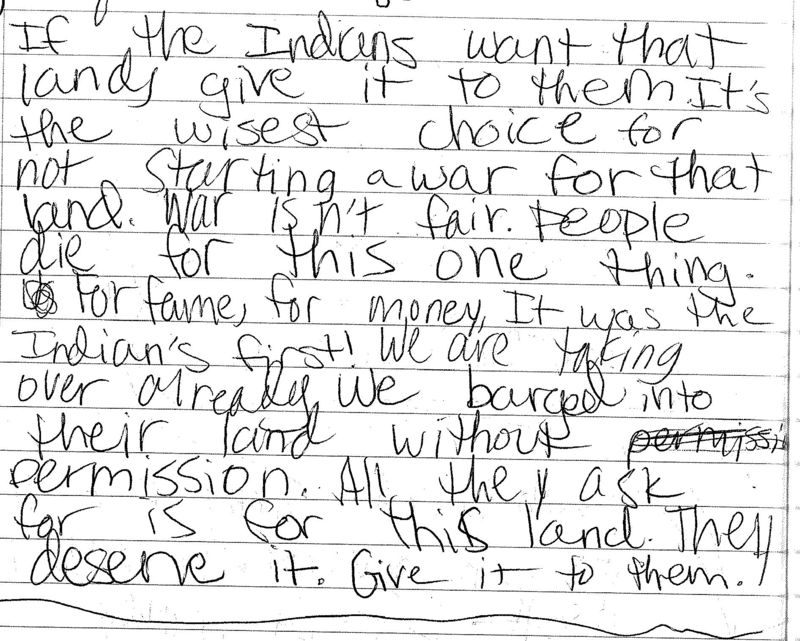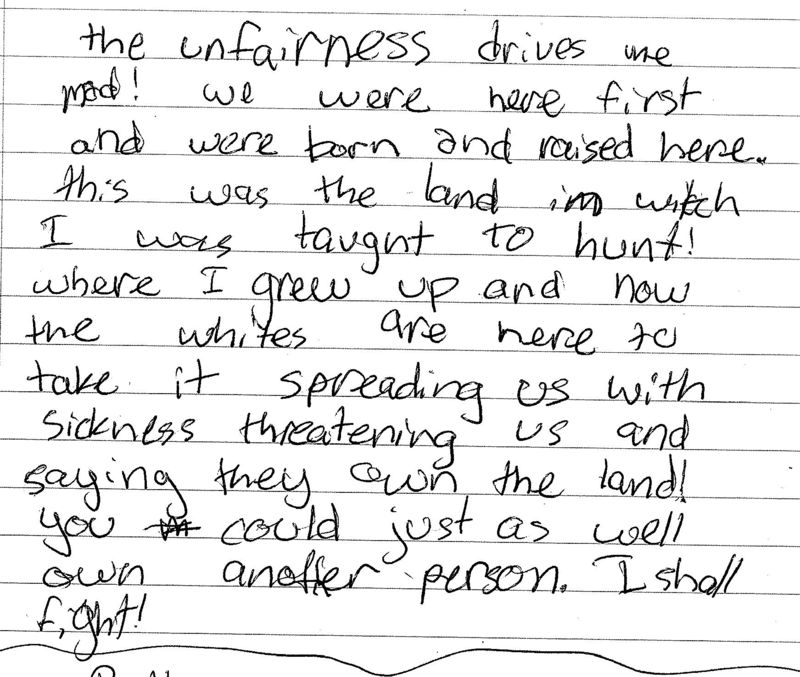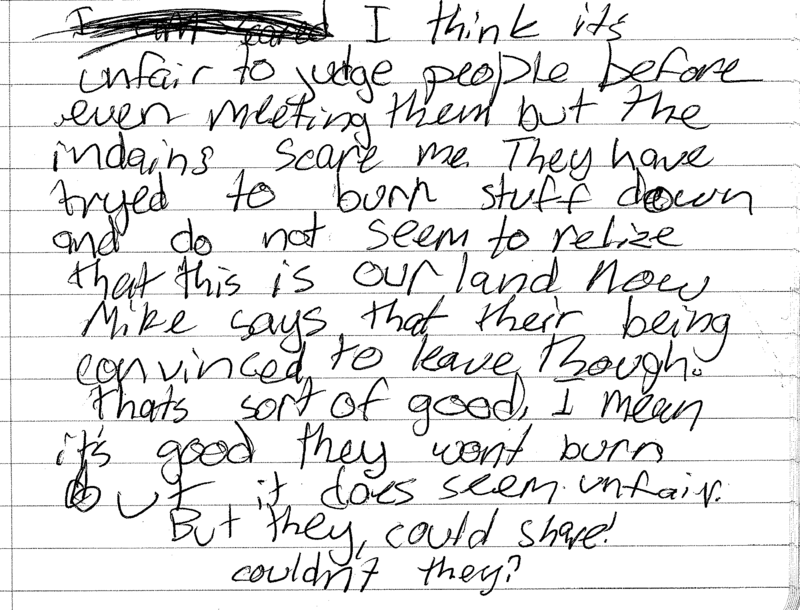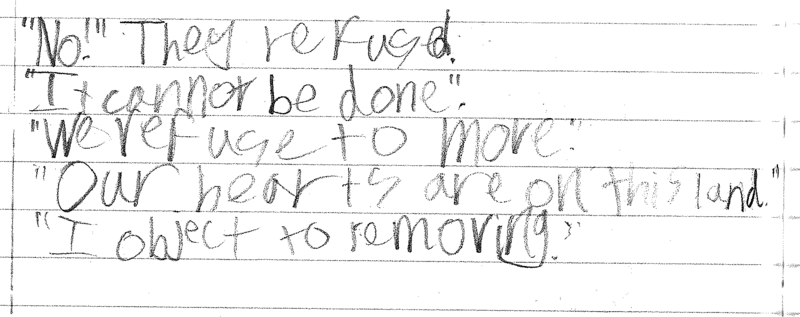What happens when 4th and 5th graders experience cultures in conflict in history?
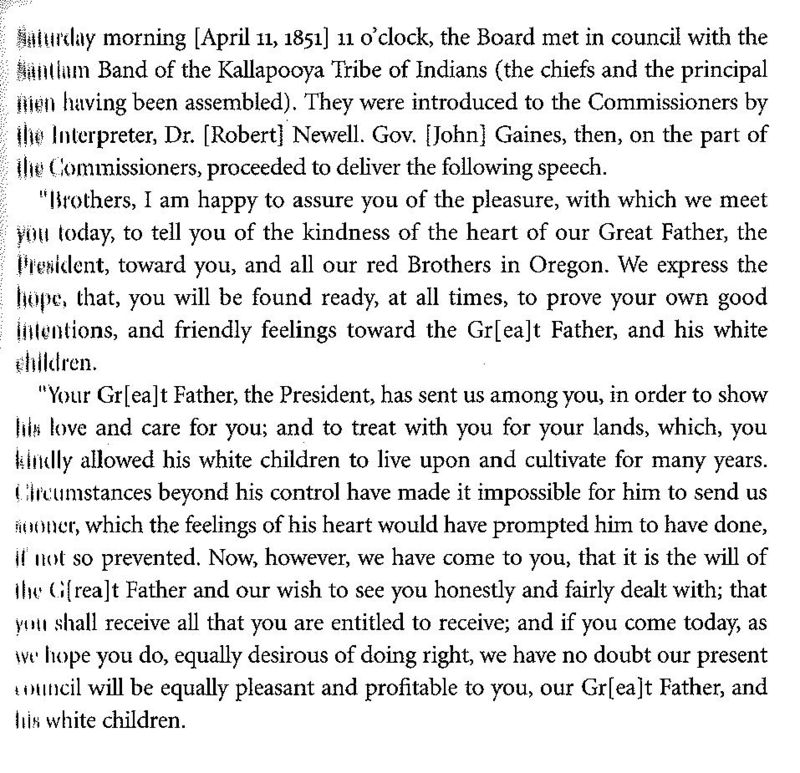
At Opal School, one of our goals for our students is for them to
Develop an understanding and curiosity about multiple points of view. Have value and empathy for experiences and perspectives different from one’s own.
For the oldest students in our school, part of this work around perspective taking happens through our study of history and of cultures in conflict. Until now in our project work, we have been diving deeply into the perspective of the overland emigrant, the settler, the European Americans who came to Oregon on the Oregon Trail in the early 1850’s.
Today we jumped with both feet into our first cultural conflict in our study of Oregon history. We started to reenact the treaty negotiation between the Santiam Band of the Kalapuya Indian Tribe (Willamette Valley) and the Willamette Valley Treaty Commission (United States government). Today our job was to read the transcript of the council and the treaty negotiations to hear the voices of the past as they actually spoke. To make our own meaning of the negotiation over the cession of land that the U.S. government hoped to gain from the Santiam.
We started the morning by learning some new vocabulary words:
Sovereignty / Sovereign Nation
Treaty
Cede / Cession
After reading a short text and talking to their table mates, the students in Opal 4 came up with these definitions:
There are lots of kinds of treaties, but they are all agreements between sovereign nations. A sovereign nation is a country or a group that has its own government and rules itself. To cede something is to give it up, and a cession of something is the giving up of something.
Then they were assigned roles in the treaty negotiation. Some were Willamette Valley Treaty Commissioners and some were chiefs of the Santiam Band. Others were interested observers from both sides of the table. We also had the interpreter to support our negotiations.
NOTE: Transcript of the Willamette Valley Treaty Commission Council 1851 is from Oregon Indians: Voices from Two Centuries edited by Stephen Dow Beckham, Oregon State University Press, 2006, pp. 116-125.
MM Great Father? That is what they thought the Indians would understand.
MC and his little children? They must have thought the Native Americans were so dumb.
MM It really shows how they thought back then.
DO A chief is not really like the president. They are in charge of a small group of people.
SBM I think they are the same. They do the same things.
Teacher: Why did they refer to the President as the Great Father?
ET Then he can sound scary and good.
NF Like a father takes care of us and they wanted the Indians to think that the Great Father would take care of them.
RC Like a magical person who was superior in the US.
and the transcript continues:
Ti-a-can: We were much pleased with the speech that was delivered to us and we are friendly to the whites and we always have been. We are willing to do as the Great Father wishes and part with all of our lands except a small portion that we wish to live upon, feed our horses and cattle and cultivate.
Gaines: Are you willing to remove beyond the Cascade Mountains if our Government will give you as good a piece of land there and pay all of your expenses for the removal?
Ti-a-can, Alquema and Sophan together: NO!
Alquema: We once were a great people but now we have decreased to nothing, and in a short time the whites will have all of our land without our removing.
Teacher: What just happened?
KB He’s willing to give all the land we have right now to the white men and white women except for a small portion that we can live on.
AW They’re doing this because they have been friendly to the white people or the settlers and they always have been and they don’t want to break that relationship, but they also need land that they can live on and cultivate, raise their horses and cattle on and live a good life. They want to feel like it’s actually their home. They are doing it for them because they want to be friendly and not be in a war with them.
Teacher: Does that seem like a fair offer?
Many voices: Yes.
Ti-a-can: We are willing to make a Treaty and sell all of our land except that between the forks of the River Santiam which we wish to reserve.
Gaines: Could a reserve be made there without taking in the claims occupied by white settlers?
Ti-a-can: It cannot be done.
Allen: For the good of your people it would be better for you to be entirely separated from the whites, and for that reason, it will be better for you to remove to a reserve beyond the Cascade Mountains, that would be selected for you or that you might select. There your people would be furnished with teachers to teach your children and teach you how to farm. And with plows, tools, etc. necessary in farming and building houses etc. and blankets to keep you warm. There our government would protect you both from the encroachments of the whites as any neighboring tribes of Indians, whereas, if you remain among the whites, it will inevitably end in your annihilation as a people.
Alquema: I object to removing. We can now see that we threw away our country, but we want to keep this piece of land as our reserve.
Gaines to Newell (interpreter): Impress upon them the necessity of being separated from the whites, in making their reserve, and of going beyond the Cascade Range. (to the Indian chiefs): There are different influences of whites, the one acting by instruction from the government, the other being citizens merely. The first would protect you, while the latter would be apt to encroach upon your rights.
Ti-a-can: Our hearts are on this piece of land. We do not wish to leave it.
EY They were once the only people there and they had everything settled for them. Then all of the settlers came and there was less and less Indians. ‘Cause of the diseases that the settlers brought.
RC I thought I saw somewhere about the malaria.
EY It was in our college text.
Teacher: What are the Indians predicting that will just happen anyway?
DO The white people might just kick them out.
MG Even if they have that small piece of land eventually it will be gone too.
Teacher: Why?
DO The whites will get selfish and they will want all of the land.
SBM And they’ll die.
DO They are getting a lot of sicknesses.
How did the students react to hearing these words from the history of their state? For many of them, this was the first time they had experienced this level of discord and conflict in what is now a very personal history for them. It was emotional and hard.
For others who had heard similar words before and who know that Native people being forcibly removed from their ancestral land was a story repeated time and again in the history of our country and our state, this was a very different experience.
MM: Nothing surprised me about this. I already know that they’re going to get kicked off their land. Actually, it is surprising that they are standing up to the Europeans, but we know they’re going to have to move eventually. The European Americans have all the power.
And some students jumped right into reacting to the proceedings from various perspectives. BM wrote three paragraphs, one as the Indian chief she played in the negotiation:
one from her perspective as an Opal 4 student in 2012,
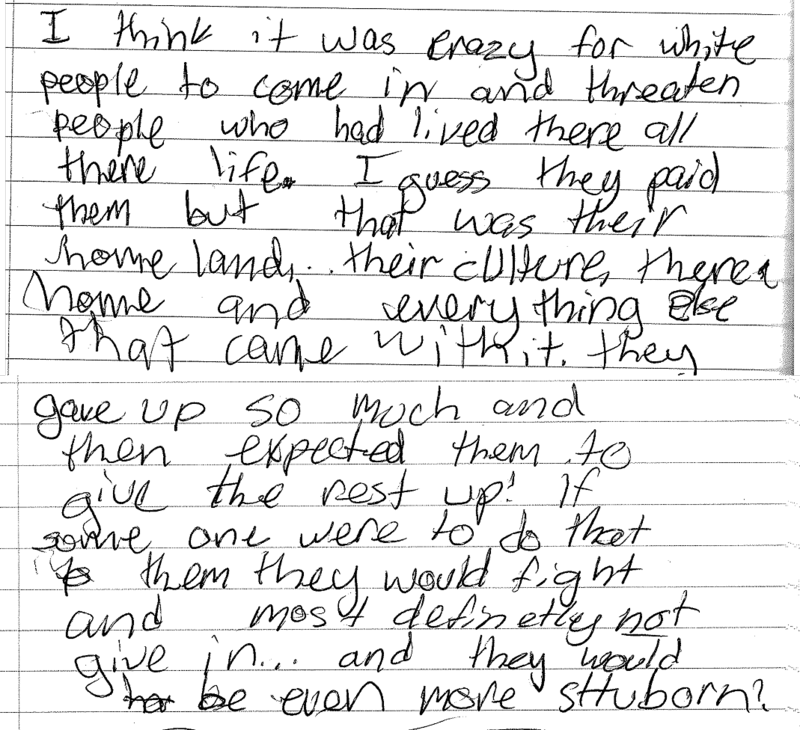
one has her pioneer character, Jane.
RC echoed the Santiam Kalapuyas words to let them linger


